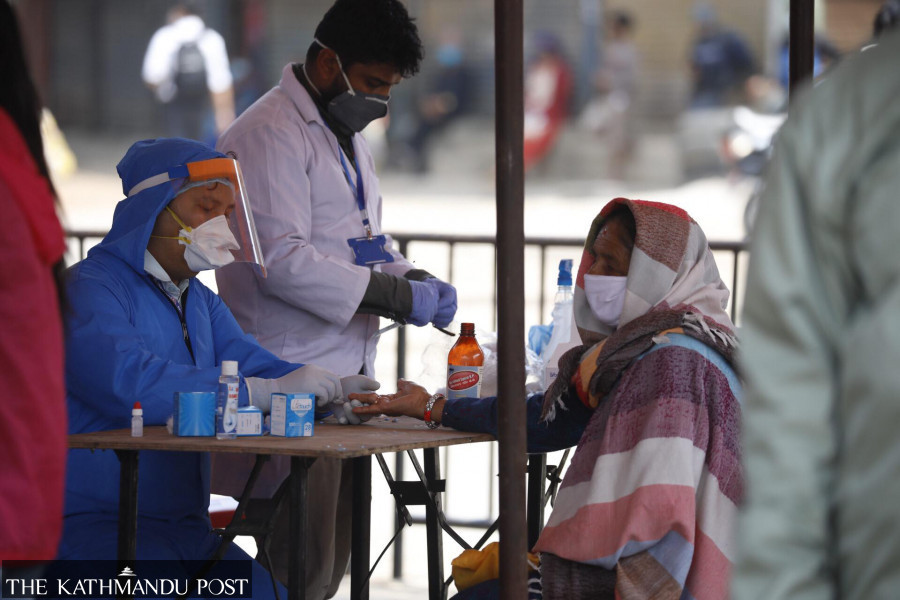Health
Omicron’s XBB.1.16 confirmed in all swab samples tested
While infections grow, the National Immunisation Advisory Committee, a vital expert panel, is no longer in existence.
Arjun Poudel
Omicron’s sub-variant XBB.1.16 was detected in all 16 swab samples collected from Covid-19 infected persons, officials said on Sunday.
The new sub-variant of coronavirus was confirmed recently in the samples through whole-genome sequencing carried out at the Dhulikhel Hospital.
Whole-genome sequencing is a comprehensive method of analysing the entire DNA sequence of an organism’s genes.
Doctors at the hospital said that the new sub-variant might have replaced all other existing variants.
“Almost everyone undergoing the test at our hospital is testing positive for Covid-19. This suggests the presence of the highly infective XBB.1.16,” said Dr Rajiv Shrestha, an infectious disease expert at the hospital. “We have been testing otherwise healthy people going abroad and patients admitted for treatment for other ailments.”
Health Ministry’s data on Covid too indicates that the sub-variant of the virus has been spreading rapidly in the communities. Of 168 PCR tests, 41 tested positive on Saturday and the test positivity rate is currently more than 24 percent.
XBB.1.16 sub-variant, a hybrid lineage of two Omicron sub-variants, is also spreading in India and has the capacity to evade immunity from prior infections and vaccinations.
“There have been no measures to contain the spread of the virus and no one seems to be taking the ongoing surge seriously,” said Shrestha. “Even people having Covid symptoms are not testing and are isolating themselves.”
What concerns the experts more is that the new year is at hand, there are ongoing election campaigns and rallies, and religious festivals are being held in many places. All of these combined could turn into superspreader events.
Moreover, the government neither has a health minister nor an expert panel on vaccination amid the new surge in Covid infections. With the CPN-UML minister resigning some six weeks ago, a new health minister is yet to be appointed, as a result of which decisions on the prevention of the virus’ spread are not being taken.
The four-year tenure of the National Immunisation Advisory Committee, an expert panel formed for taking crucial decisions on vaccination, ended in December. The Health Ministry had proposed extending the committee’s tenure months ago. However, it has not happened in the absence of a health minister.
“The then minister [Padam Giri] could have approved the proposal, but it wasn't a priority at the time,” an official at the Health Ministry said, asking not to be named as the person is not authorised to speak to the media.
The committee played a vital role in helping introduce new vaccines in the country during the coronavirus pandemic, in preventing authorities from allowing private firms to sell vaccine doses, and keeping foreign firms from carrying out vaccine trials and introducing new vaccines haphazardly.
The committee had insisted that nobody will be safe until everybody is safe, and convinced the authorities to provide vaccines, free of cost, to all.
Government agencies had planned on allowing private firms to import and sell vaccines to those who could afford to pay. Health Ministry officials concede that the committee’s decisions helped them to resist unwanted pressures from higher authorities.
The committee included representatives of the World Health Organisation and the United Nations Children's Fund (Unicef).
“The committee's last decision was to administer bivalent Covid vaccine as a second booster dose to certain priority groups including those above 55 years,” said Dr Ramesh Kanta Adhikari, former chief of the committee.
Health authorities currently have vaccine doses in stock which are being used to vaccinate certain priority groups—people above 55, pregnant women, health workers, those with compromised immunity and those taking immunosuppressants.
But the problem is that the uptake of the vaccine in the aforementioned age group is very low, and people of other age groups have been deprived of the vaccine, according to officials.
On Sunday, 55 people tested positive for Covid-19. The Health Ministry said that seven people in serious condition are being treated in the intensive care units of several Kathmandu Valley hospitals, while four persons reportedly are in a critical condition and are on ventilator support.
Active Covid cases in the country currently stand at 396, according to the official count.




 11.43°C Kathmandu
11.43°C Kathmandu















